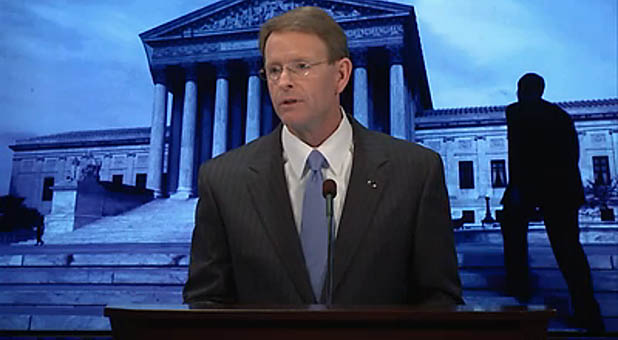Tony Perkins Responds to Tennessee’s Freedom of Conscience Bill
Last week, Tennessee Gov. Bill Haslam signed Senate Bill 1556, which prevents counselors and therapists from being forced to counsel in a manner that conflicts with their religious beliefs, provided they refer to another counselor or therapist, prompting outrage among liberals, the LGBT community and the American Counseling Association.
In response to the vitriol aimed at Haslam and the State of Tennessee, Family Research Council president Tony Perkins released a statement supporting the new freedom-of-conscience law. He said lawmakers were right to protect the ability of therapists and counselors to serve in a manner that doesn’t conflict with their deeply-held religious beliefs.
“America has a long and storied history of respecting Americans’ freedom to believe and actually live their lives according to those beliefs,” he said. “It was this tolerance and understanding that led the first Congress and the American people to enshrine religious freedom in our Constitution.”
Perkins said SB 1556 is an “important first step” in preserving those fundamental freedoms for those who don’t agree with the political left’s “radical ideology.” He said the Volunteer State was joining North Carolina and Mississippi in the “growing list of states” that has refused to criminalize people whose beliefs about sexuality and marriage “are at odds with President Obama’s extreme political and social agenda.”
“The response from the Left to this modest bill once again reveals the absolute intolerance of those seeking to redefine human relationships and sexuality,” he added. “It is clear that their goal is not access to services, it’s forcing all Americans to accept their system of beliefs or face government imposed penalties. They believe that a therapist or counselor who can’t in good conscience violate their deeply held beliefs should not be allowed to continue to serve.”
Perkins then invoked the story of Julea Ward, an Eastern Michigan University counseling student who was expelled for seeking to refer a potential client she could not in good conscience serve. She recently won a settlement in her case after the Sixth Circuit Court of Appeals issued an opinion in her favor.
“A university cannot compel a student to alter or violate her belief systems based on a phantom policy as the price for obtaining a degree,” the court wrote in its opinion. “Why treat Ward differently? That her conflict arose from religious convictions is not a good answer; that her conflict arose from religious convictions for which the department at times showed little tolerance is a worse answer.”
The Alliance Defending Freedom secured the legal victory for Ward and other students like her.
“Many therapists and counselors are motivated to serve by sincerely held religious beliefs,” Perkins concluded. “They and everyone else are entitled to First Amendment protections.”














































